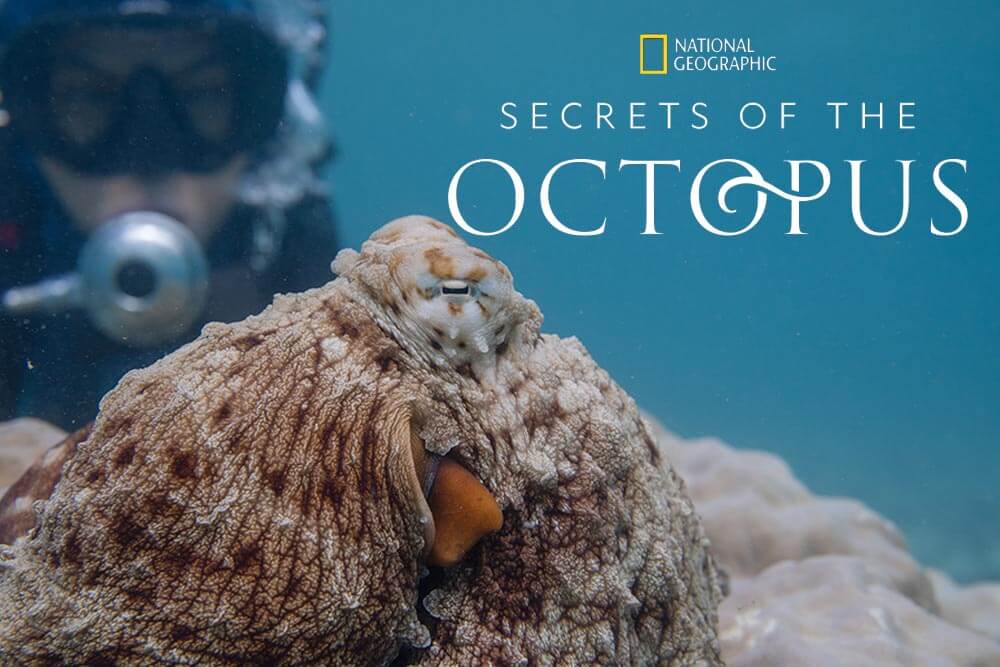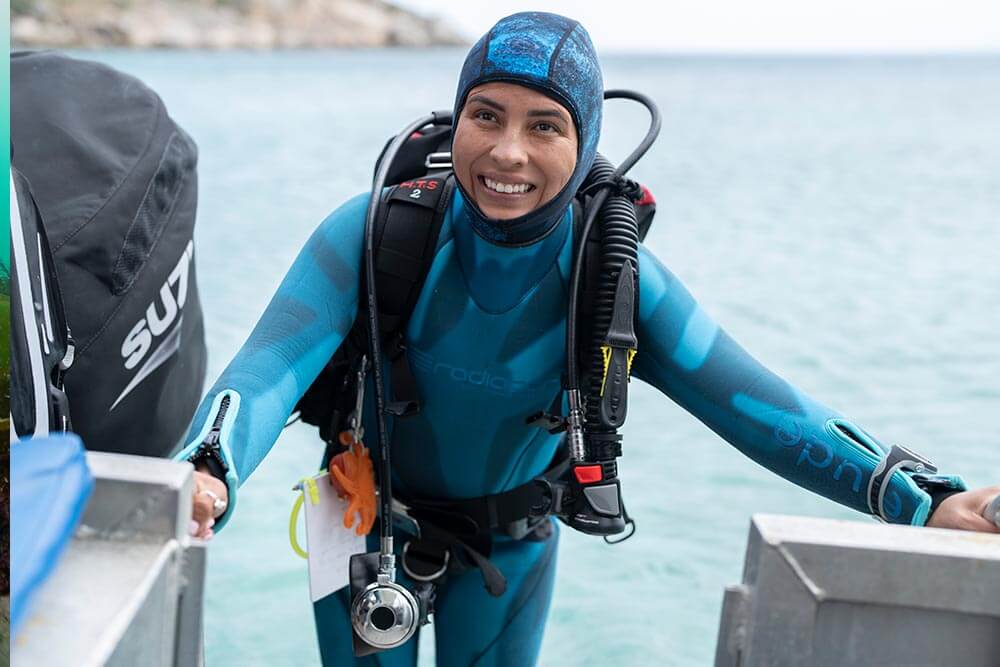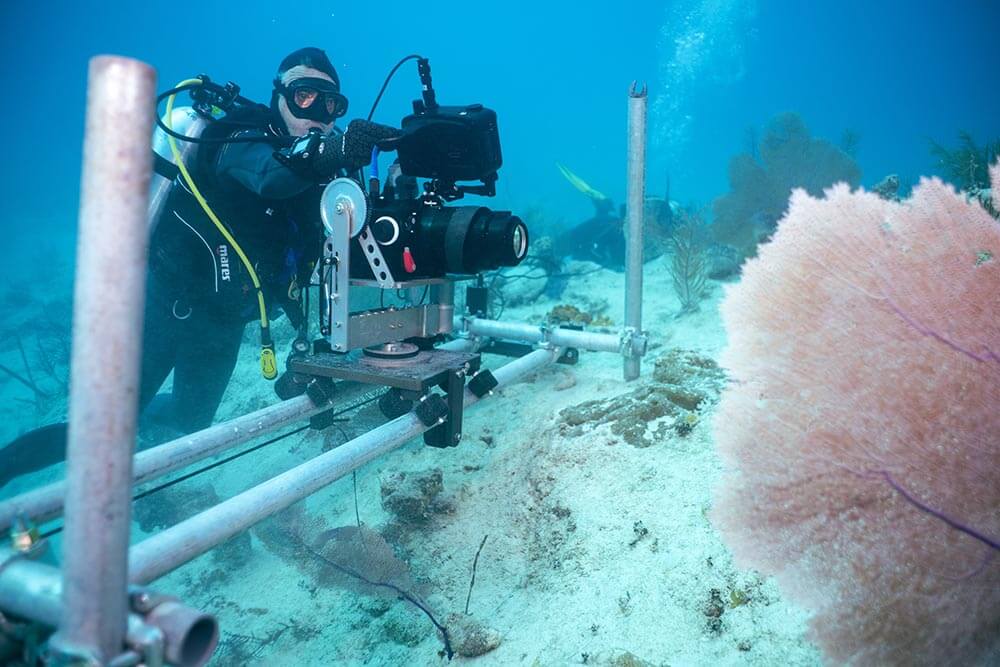
A preview of Secrets of the Octopus, premiering this Earth Day (22 April) on National Geographic LIVE and Disney+
A new three-part documentary series is coming to National Geographic LIVE and Disney+ this Earth Day, offering a fantastic glimpse into the lives and behaviours of octopuses.
Narrated by Paul Rudd and produced by film-maker and explorer, James Cameron, Secrets of the Octopus is presented and co-produced by National Geographic Explorer, Dr Alex Schnell, a marine biologist and comparative psychologist, who has spent years studying cephalopod behaviour since first becoming enamoured of them as a child.
‘I had the luxury of growing up on the eastern beaches of Sydney,’ said Dr Schnell when we had the chance to speak, ‘so the ocean was my playground, and I still remember dropping my bag off at my house and running down this back alley to go to the beach that we lived by, and I would just spend all my time in rock pools, finding starfish, crabs, and then there was one day – I was about five – where I came across an octopus.
‘I thought it was a sea slug at first; I’d never seen one before – we had this kind of moment where it reached out and touched my hand, and I think from that day on. I was like, I’m gonna be a marine biologist!’

Schnell’s genuine passion and enthusiasm for her subject is clear when she speaks – and it shines through in Secrets of the Octopus, which travels the globe to highlight the immense diversity of octopuses, with the day octopus of the Great Barrier Reef; blue-ringed, coconut and mimic octopuses in the Lembeh Strait; and the giant Pacific octopus off the coast of Canada among just some of the species highlighted.
The behaviours filmed over two and a half years and more than 1,000 hours in the water are entrancing, particularly the level of interaction between some of the subjects and their human observers. Schnell befriends a day octopus on the Great Barrier Reef in scenes somewhat reminiscent of My Octopus Teacher, but presented with much greater scientific introspection, thanks to her off-camera work as a scientist studying the intellectual ability of octopuses and their cousins.
‘I studied communication in cephalopods, but then I got really interested in their minds,’ she said, ‘and so I ended transitioning into more comparative psychology because I wanted to understand what was underpinning the behaviour that I was seeing.
‘I get a lot of inspiration when I’m out in the field in the wild with octopuses, and I see them behave in a certain way and I wonder – what’s going on in that mind, and what’s driving that behaviour?’

Communication, mimicry, attack and defensive behaviours are explored throughout the series – including a fascinating battle between a coconut octopus and mantis shrimp in the Lembeh Strait, during which the octopus, fed up of being repeatedly punched by the shrimp, picks up a shell to use as a shield and drive its competitor away – distinguishing the octopus as one of a very small group of animals capable of improvisational use of tools.
‘They are great problem solvers, they have a fantastic memory, and some of the secrets that we reveal in the series show they can use tools, which is a trait that we thought was solely human until the 1960s,’ said Schnell. ‘We are seeing types of memory and self-control and types of planning that we thought were only really observed in chimpanzees and crows, so that’s crazy because we’re talking about an animal that diverged from us 550 million years ago, and our common ancestor was something that looked like a worm!’
Secrets of the Octopus is an absolute must-watch, and I say this as somebody who often avoids underwater documentaries because – having spent so much time there – I find myself rather irritated by over-exuberant presenters who don’t appear to know how to dive, some of whom are possibly only in tune with the water when they’re in the hotel jacuzzi after filming.

Unnecessary drama is entirely absent from the series. Paul Rudd’s narration is pleasant, reasonably engaging and occasionally dips into the humour for which his Hollywood performances are known; the background music is pleasantly quirky (although I wish the sound effects department would tone things down a little); and I enjoyed the post-documentary debrief between Dr Schnell and James Cameron that brought the series to its conclusion.
‘I hope that the series is really going to highlight the life of the octopus,’ said Schnell as we brought our interview to a close; ‘this extraordinary creature that we find species that live in every ocean. I think that our series is going to showcase the octopuses’ vulnerability, intelligence, and capacity for emotions, so I think that this animal is a really compelling ambassador to make people care about our blue planet – and it’s perfect that it comes out on the 22 of April, because that’s Earth Day.’
Secrets of the Octopus will do exactly that.
DIVE’s rating: Fantastic underwater wildlife documentary; highly recommended.
Secrets of the Octopus premieres on Monday 22nd April at 8pm – 10pm on Nat Geo WILD and Disney+
- Aggressor Adventures announces upgraded Red Sea Aggressor IV - 13 February 2026
- New documentary spotlights endangered sicklefin devil rays of the Azores - 13 February 2026
- DIVE’s Big Shot Light and Shadow – win an Aggressor Adventures liveaboard trip - 12 February 2026


